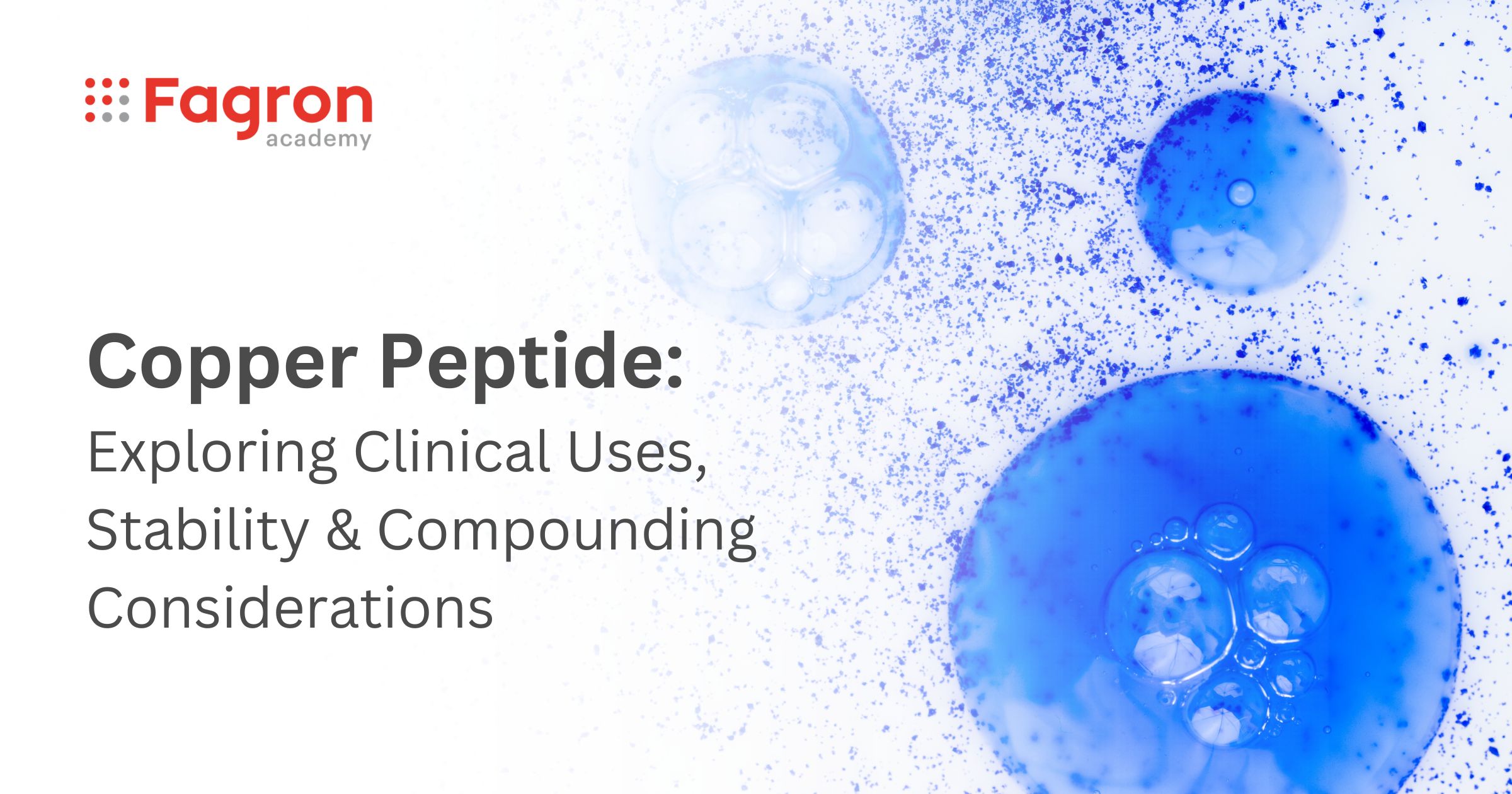
What is Guidance for Industry (GFI) 256?
GFI 256 is a guidance for industry intended to provide clarification from the FDA on compounding animal drugs from bulk drug substances. The guidance does not apply to animal drugs compounded from FDA-approved animal or human drugs, which the FDA generally considers to be legal extra label uses of such drugs.1 The FDA considers compounding animal drugs from bulk substances by pharmacists and veterinarians to violate aspects of the FD&C Act. Given the wide range of animal species and their varying needs, the FDA acknowledges that in some circumstances there may be no medically appropriate commercially available treatment options or commercially available FDA approved drugs may not be suitable for use as a source of active pharmaceutical ingredient (API) in some circumstances. This guidance lays out the circumstances in which the FDA generally does NOT intend to take enforcement action for those compounding animal drugs from bulk API.
1. See the Animal Medicinal Drug Use Clarification Act of 1994 for further information
What are the circumstances in which the FDA states that they do NOT intend to take enforcement action against those compounding animal drugs for non-food producing animals from bulk APIs?
The GFI 256 document should be referenced for a full explanation, but the below is a summarized list of the circumstances listed in the guidance document:
1. The drug is compounded under the supervision of a veterinarian or pharmacist in a state or federally licensed facility
2. The compounding is done in compliance with relevant state laws and regulations
3. Bulk APIs, excipients, and finished drug products used meet the standards set forth in applicable USP-NF monographs and other FD&C requirements
4. The drug is dispensed by a pharmacy after the receipt of a valid script for a specific patient or by the veterinarian to the owner/caretaker of the patient
5. The compounded drug is not a copy of an FDA approved drug or if it is a copy, there is a documented reason why the compounded product will produce a clinical difference in the identified patient as determined by the treated veterinarian and this rationale is documented on the prescription or a document kept with the prescription
6. If the animal drug has the same API as one or more FDA approved drugs, the compounder has determined and documented reasons why the FDA approved drug cannot be used as the bulk source of API
7. Upon becoming aware of any adverse event or product defect associated with any compounded animal drug from bulk API, the pharmacist or veterinarian who compounded the product files a Form FDA 1932a within 15 business days
8. The labeling includes
a. Name of drug
b. Strength of drug
c. Species of patient
d. Patient ID (ex: name of animal)
e. Name, address, and contact info of compounding facility
f. A beyond-use-date
h. The statement “This is a compounded drug. Not an FDA approved or indexed drug” is included on the label
i. The statement “Caution: Federal law restricts this drug to use by or on the order of a licensed veterinarian” is included on the label
What counts as a “clinical difference”?
The FDA clarifies in the guidance that “clinical difference” may encompass a wide range of potential reasons including harmful ingredients in an FDA approved medication for certain animals, or strength or concentration change to accommodate wide variations in size in different species, as well as aspects such as dosage form or flavoring. The FDA states that they generally do not intend to question a veterinarian’s determination that a commercially available product is unsuitable for a given animal or species so long as appropriate documentation regarding rationale is noted.
Example: Pimecrolimus ophthalmic drops are determined to be necessary for management of cyclosporine-resistant keratoconjunctivitis sicca in a canine patient. There are no FDA approved animal drugs containing pimecrolimus and the FDA approved pimecrolimus products for human use are creams that are non-sterile and contain excipients that are inappropriate for ophthalmic use.
What are the required changes to my documentation and labeling for patient specific prescriptions in non-food producing animals?
The FDA will require that the below statements be added to labels of compounded drugs from bulk APIs:
1. “Report suspected adverse reactions to the [pharmacist or veterinarian who compounded the drug] and to the FDA using online Form FDA 1932a”
2. “This is a compounded drug. Not an FDA approved or indexed drug”
3. “Caution: Federal law restricts this drug to use by or on the order of a licensed veterinarian”
You will also be required to document veterinarian justification of “clinical difference” or other reason for compounding (such as the specific API not being present in an FDA approved drug product that may be used as the source of API) on the prescription or on a document kept with the prescription.
What are the requirements for reporting adverse effects to the FDA?
If a compounder has compounded an animal drug from bulk substances, the FDA will require the compounder to report any adverse reactions or product defects associated with the compounded drug to the FDA by filling out a form FDA 1932a within 15 business days. A copy of the form can be found here: How to Report Animal Drug and Device Side Effects and Product Problems | FDA
Which bulk APIs meet the criteria for compounding for office use for non-food producing animals?
In addition to many of the restrictions applied to compounded veterinary medications from bulk pursuant to a patient-specific prescription, including specific labeling and reporting requirements, compounds for office stock must also be included on the FDA’s “List of Bulk Drug Substances for Compounding Office Stock Drugs for Use in Non-Food Producing Animals”. A full list of APIs that may be compounded for office use can be found here List of Bulk Drug Substances for Compounding Office Stock Drugs for Use in Nonfood-Producing Animals | FDA. The FDA also has a list of substances currently under review, and substances that have been reviewed but were not added to the list of bulk drug substances. The FDA is accepting additional submissions, if there are bulk APIs that you believe should be considered for this list as their lack of availability for immediate use may result in animal suffering or death, consider submitting the substance for evaluation to the FDA by following the instructions listed here: Federal Register :: Lists of Bulk Drug Substances for Compounding: Office Stock Drugs for Use in Nonfood-Producing Animals or Drugs for Use in Food-Producing Animals or Free-Ranging Wildlife Species; Request for Nominations
Which animals are considered to be “Food-Producing” or “Free-Ranging”?
The FDA does not provide a complete list of “food-producing” animals, but includes as examples cattle, swine, chickens, turkeys, sheep, goats, fish (excluding ornamental/aquarium fish), other aquatic animal species, gamebirds, and wildlife raised or harvested for food as well as honeybees.
Which bulk APIs meet the criteria for compounding for food producing animals?
Compounding for food-producing animals is subject to increased scrutiny. Among other requirements, drugs compounded from a bulk substance for use in food producing animals must be on the “List of Bulk Drug Substances for Compounding Drugs for Use in Food-Producing Animals or Free-Ranging Wildlife Species”. The list may be found here: List of Bulk Drug Substances for Compounding Drugs for Use in Food-Producing Animals or Free-Ranging Wildlife Species | FDA. The FDA is accepting additional submissions, if there are bulk APIs that you believe should be considered for this list as their lack of availability for immediate use may result in animal suffering or death, consider submitting the substance for evaluation to the FDA by following the instructions listed here: Federal Register :: Lists of Bulk Drug Substances for Compounding: Office Stock Drugs for Use in Nonfood-Producing Animals or Drugs for Use in Food-Producing Animals or Free-Ranging Wildlife Species; Request for Nominations
When does GFI 256 go into effect?
The FDA released draft GFI 256 in 2019 and took into consideration comments made by veterinarians, pharmacy compounders, and other stakeholders. The draft GFI was further revised and was slated to be subject to enforcement as of October 1st 2022. Due to stakeholder concern and requests for clarification, enforcement has been further delayed until April 2023. Though requests for clarification from the Alliance for Pharmacy Compounding (APC) and other organizations are still outstanding, the FDA has not stated that enforcement will be further delayed.
Who will enforce GFI 256?
The FDA states in GFI 256 that it will ordinarily rely on compounding pharmacies’ home state licensing boards to provide oversight of routine compounding practices, but that the FDA may also provide oversight when considered appropriate by the agency.
Where can I go to learn more?
The full GFI 256 may be found here: CVM GFI #256 - Compounding Animal Drugs from Bulk Drug Substances | FDA
The FDA’s Official Q&A on GFI 256 may be found here: Q&A: GFI #256 - Compounding Animal Drugs from Bulk Drug Substances | FDA
Information from our industry partner the Alliance for Pharmacy Compounding may be found here: APC: Issue: GFI #256 (a4pc.org)
A Recent letter from the FDA describing their thinking on enforcement roll out may be found here: Letter to Industry: Phase-In of Inspectional Activities Related to Compounding of Animal Drugs from Bulk Drug Substances | FDA



